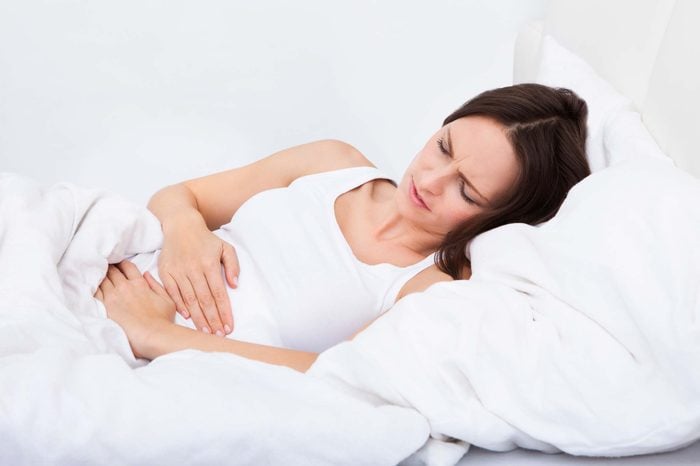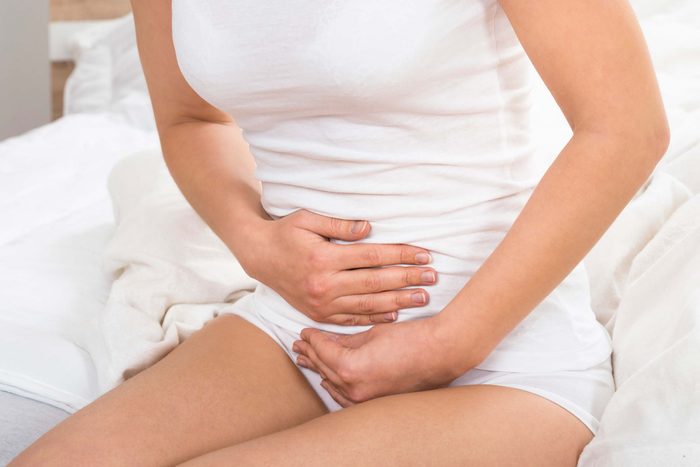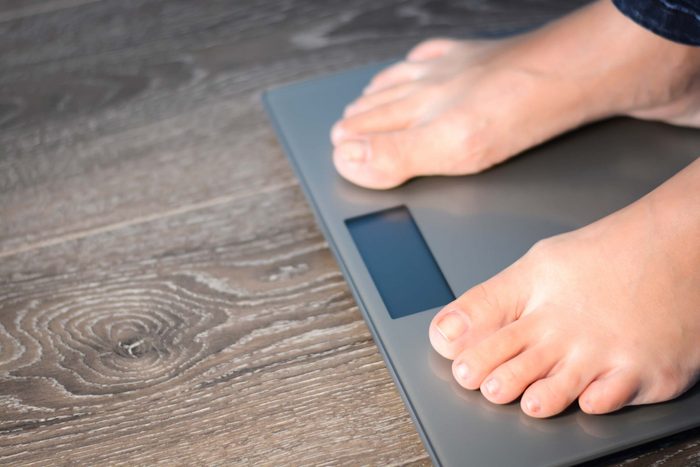
Diarrhea
It’s normal to get diarrhea once in a while, after some very greasy BBQ, a bout of food poisoning, or certainly when you have a stomach flu, but the kind of diarrhea that happens with ulcerative colitis is chronic, at least during a flare-up. (Most people with ulcerative colitis have periods of remission that can last for weeks or years, so even “chronic” symptoms may be only temporary, for as long as the flare-up lasts). The urge to empty the colon may be brought on by eating certain foods that don’t agree with you, or from emotional distress. And because with ulcerative colitis, there’s irritation or swelling and sores (or ulcers) on the inner lining of the large intestine, the diarrhea stool may also contain blood or mucus from the irritated colon, according to the Mayo Clinic. In fact, bloody diarrhea is the hallmark of ulcerative colitis. Here’s how to tell if you might have Crohn’s disease.

Canker sores
With ulcerative colitis as with other autoimmune disorders, flare-ups can cause the formation of small mouth ulcers, also known as canker sores, according to Johns Hopkins Medicine. You’re most likely to get them between the gums and lower lip or along the sides or base of the tongue. To treat a canker sore, use a medicinal mouthwash or try these home remedies for canker sores; to help prevent canker sores, make sure to eat a balanced diet, as shortfalls in vitamin B12, folate, zinc, or iron may make you more susceptible, according to the Johns Hopkins experts.

Abdominal cramps
Ulcerative colitis can cause abdominal pain as the body tries to send food through a large intestine, or colon, that’s swollen and lined with ulcers, reports the Crohn’s and Colitis Foundation (CCF). The pain has been described as “crampy,” like a charley horse in your gut. You may feel it before going number two or while you’re going. If you’re experiencing severe or chronic abdominal cramping with no obvious cause, talk to your doctor.

Malnutrition
During a flare-up of ulcerative colitis, you may develop malnutrition, as irritation in the intestines makes them less able to absorb nutrients. Malnutrition can trigger other symptoms, according to the CCF, including dizziness, fatigue, water-electrolyte imbalance, muscle weakness or loss of muscle, and weight loss, all of which can lead to permanent damage if not addressed by a medical professional. These are common signs of a vitamin deficiency.

Fatigue
It’s pretty common for us to be tired—from Netflix binges, working late, or as a side effect of medications. And while fatigue is probably a symptom of just about every illness, ulcerative colitis-related fatigue is likely linked to a lack of nutrients for energy, interrupted sleep to use the bathroom, nausea, and dehydration from the diarrhea.

Anemia
Anemia is one of the more serious ulcerative colitis signs and one reason you may feel tired. When your colon bleeds, your body can become deficient in red blood cells, causing symptoms such as fatigue, a feeling of uneasiness, muscle aches and pains, heart palpitations, difficulty thinking, and lightheadedness. In a 2016 study published in Inflammatory Bowel Diseases, researchers found that over an eight-year period, 70 percent of the 836 ulcerative colitis patients went on to develop anemia. For some patients, iron deficiency anemia may be the first sign of ulcerative colitis.

Weight loss
If you’re having a lot of diarrhea, you’re not absorbing nutrients efficiently from your food, and you’re not eating as much because it causes abdominal cramping and nausea, it’s pretty clear why you might then experience weight loss with ulcerative colitis, suggests CCF. If you’re dropping pounds unexpectedly, without trying, talk to your doctor about the possibility of ulcerative colitis.

